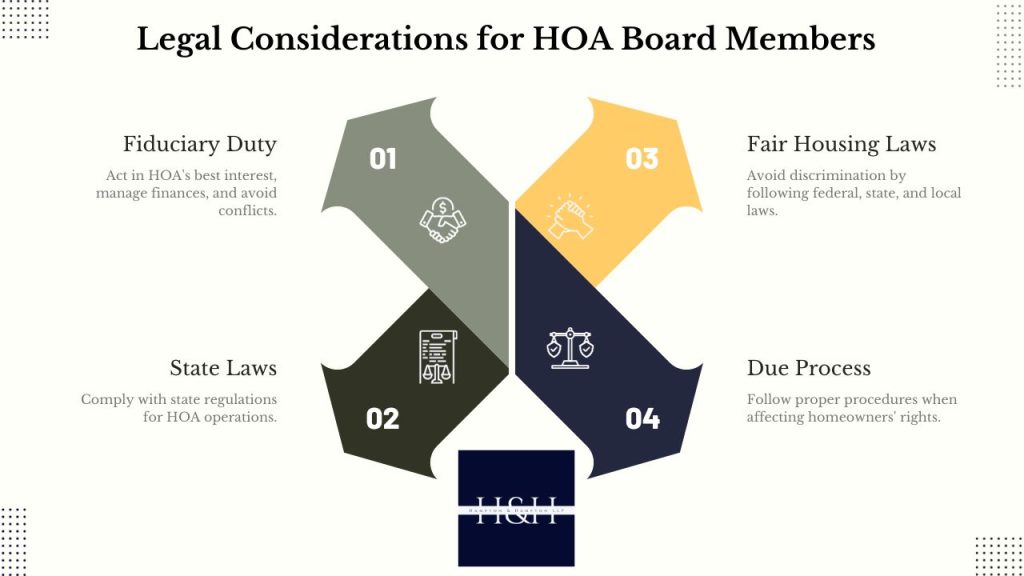Serving on a Homeowners’ Association (HOA) board or in any leadership capacity means being responsible for managing and maintaining the community, upholding its rules and regulations, and ensuring the well-being of its residents.
Meanwhile, HOA Board Members will provide necessary support for homeowner leadership. They are the ones who will represent the needs of residents and will be responsible for enforcing policies, discussing developments, and implementing strategic planning on how to improve the residential community.
Board members collectively contribute to the effective governance and well-being of the community. Their role in a homeowner association is crucial to maintaining a harmonious living environment.
What Is a Homeowners Association Board of Directors?
The HOA Board of Directors is responsible for the governance and leadership of the association. They participate in board meetings and decision-making processes, working collaboratively with other board members to set policies and priorities for the organization. The board of directors is expected to uphold and enforce HOA’s governing documents, which include bylaws, covenants, conditions, and restrictions (CC&Rs).
As they oversee the homeowner’s association, they are also responsible for managing its finances. This includes managing the HOA budget, ensuring financial reporting, and making decisions on spending the association’s finances. They will also be the ones to create and implement long-term plans for the community’s maintenance, improvements, and financial stability.
Being on the Board of Directors is a demanding role that requires dedication, good communication, organizational skills, and the ability to work well with a diverse group of homeowners. They need to act in the community’s best interests – by upholding the principles of fair, equitable, and responsible governance.
Board Training Understanding Governing Documents

Homeowners’ Association (HOA) board members must have a solid understanding of the various governing documents that dictate the community’s rules, regulations, and operations. It is recommended that board members go through some form of board training. These documents provide the framework for managing the HOA and how residents are expected to conduct themselves.
- Covenants, Conditions, and Restrictions (CC&Rs)CC&Rs are the most fundamental regulatory documents for an HOA. They outline the rules and restrictions homeowners must adhere to regarding property use, architectural guidelines, maintenance, and other aspects of community living.
- BylawsThe bylaws of the HOA specify how the association should be organized and operated. They typically cover topics like board member elections, meetings, voting procedures, and the powers and responsibilities of the board.
- Rules and RegulationsHOAs often have additional rules and regulations that may be more specific and detailed than what is outlined in the CC&Rs. These can pertain to issues like pet policies, noise restrictions, parking, and common area usage.
- Architectural Guidelines or Design StandardsThese documents provide specific instructions for homeowners when making property changes or improvements, including exterior modifications and landscaping. They help maintain a consistent and aesthetically pleasing community appearance.
- Declaration of Easements, Rights, and RestrictionsThis document outlines any easements, rights-of-way, or other restrictions on property use within the community. It can affect how homeowners and the HOA use certain areas and access utilities.
These are some of the managing documents a homeowner’s association may have. Depending on the unique needs of the community, an HOA may have other documents outlining important policies that will serve the community’s best interests. Members of the HOA board are expected to be the ones who will enforce or make changes to the policies stated in these rule documents.
Ensuring Compliance With the Governing Documents

Complying with governing documents within a Homeowners’ Association (HOA) is one of the main duties of board members. To implement consistent compliance, education and communication are vital to keeping residents informed. Ensure all residents are aware of their responsibilities through regular communication in newsletters, emails, community meetings, and the HOA website.
Choose a communication channel where homeowners will be informed about changes in policies. Ideally, regulatory documents must be reviewed and updated regularly to ensure they remain relevant and effective in meeting community’s standards. Seek input from homeowners when considering changes or updates to governing documents.
When addressing compliance issues, allow homeowners to present their case and ensure that due process is followed. Maintain accurate records of violations, actions taken, and communications with homeowners to ensure transparency. Also, consider offering dispute resolution mechanisms like mediation to resolve conflicts between homeowners and the HOA. This can help avoid unnecessary legal action.
If a conflict does arise, consult an attorney regarding state laws governing HOA forcible entry and detainer actions, evictions, and the foreclosure process to address non compliance with HOA governing documents and laws.
Board Elections and Ensuring Fair and Transparent Processes
A fair and transparent Homeowners’ Association (HOA) board election process, is essential to maintain the trust and participation of community members. There have to be clear election procedures, with nominations and voting methods properly discussed. Make these procedures available through the HOA’s website, newsletters, and other communication channels.
As for the nomination procedure, establish a nominating committee consisting of impartial community members to oversee the election process. The committee should recruit and vet candidates to ensure they meet the eligibility criteria, and conduct during the election.
The voting methods must be accessible to homeowners. If feasible, offer multiple methods for casting votes, such as in-person voting at a meeting, mail-in ballots, and online voting. Ensure that homeowners can vote in a way that is convenient for them.
Why this is important: A fair and transparent HOA board election process is crucial from a legal standpoint. It helps maintain trust and encourages active community participation. By openly discussing and making election procedures available, homeowners can feel confident in the integrity of the process. Establishing an impartial nominating committee ensures that eligible candidates are properly vetted and the vote is conducted fairly.
A fair and transparent HOA board election process is critical from a legal standpoint. It helps maintain trust and encourages active community participation. By openly discussing and making voting procedures available, homeowners can feel confident in the integrity of the process. Establishing an impartial nominating committee ensures that eligible candidates are properly vetted, and the election is conducted fairly.
Responsibilities to the Community
HOA board members have crucial roles and responsibilities to its community of residents. They have to provide homeowners with bylaws and have transparent communication when it comes to scheduling meetings and changes in the policies. This includes timely announcement of board meeting schedules and ensuring that constituents are properly informed about board’s activities.
From enforcing the governing documents and overseeing finances to administering the voting process, HOA board members take on an important role that impacts the community. Every decision they make has to contribute to ensuring that the community is safe, well-organized, and a livable, vibrant community for homeowners.
Why this is Important: Ensuring fair and transparent board elections is of utmost importance for HOA board members from a legal standpoint. Board elections are a fundamental part of the democratic process within the community, and any misconduct or lack of transparency in this process can lead to legal challenges. By following proper procedures and providing homeowners with clear information about the election process, board members can protect the integrity of their HOA and mitigate the risk of legal disputes. Moreover, transparent board elections foster trust and confidence among homeowners, which is essential for maintaining a harmonious community environment.
Legal Considerations for HOA Board Members
Homeowners’ Association (HOA) board members must be aware of various legal considerations to effectively carry out their responsibilities and protect the interests of the community. This includes understanding their fiduciary duty to act in the HOA’s and its members’ best interests. They must adhere to and enforce HOA’s governing documents to avoid legal disputes.
Fiduciary Duty
Board members have a fiduciary duty to act on the HOA and its members’ best interests. This duty includes prudently managing the association’s finances and avoiding conflicts of interest. They must uphold integrity in ensuring that the community’s finances are spent in a way that serves the needs of the residents. It is best practice to prepare, review, and share the annual budget with the association.
State Laws
HOAs are subject to state laws that govern their operation. Board members must ensure the association complies with these laws, including open meeting regulations, financial disclosures, elections, and more.
Fair Housing Laws
Board members must avoid discrimination and ensure compliance with federal, state, and local fair housing laws. These laws prohibit discrimination based on factors such as race, color, religion, gender, disability, familial status, and national origin.
Due Process
When taking actions that may affect homeowners’ rights, such as imposing fines, suspending privileges, or approving architectural changes, the board must follow due process and provide affected homeowners with notice and an opportunity to be heard. Respect the confidentiality of certain HOA matters, especially when dealing with legal issues, disputes, or sensitive homeowner information. This also includes conflict resolutions and possible eviction processes: a comprehensive due process is necessary.
Contracts and Agreements
When entering into contracts with vendors, service providers, or professionals, board members should ensure that the terms and agreements are legally sound and in the best interest of the HOA. Having legal counsel can be helpful in this case to ensure a transparent arrangement when entering a contract.
Legal Counsel
At times, there could be complex legal issues arising from the community, including it’s governing documents. An HOA may consult with legal counsel when facing complex legal issues, disputes, or when considering amendments to governing documents. Legal advice can help the board make informed decisions.
Understanding and adhering to these legal considerations is vital for HOA board members to protect the association’s legal standing, maintain good governance, and avoid potential legal liabilities. Legal counsel can provide guidance and support in navigating complex legal issues that may arise within the HOA.
Empowering HOA Board Members
The HOA board members represent the welfare of the homeowners. Whatever decision they make, or the policy they enforce must reflect the best interests of the community. Thus, it’s critical for HOA board members to be aware of their obligations and responsibilities, especially when it comes to legal issues affecting homeowners.
To ensure that HOA board members follow proper legal processes, a legal consultation can help them identify key areas in their operations and governing documents. An HOA may have several legal compliance and other concerns that need legal expertise to settle matters.
Hampton and Hampton is a trusted legal firm that can help your HOA review the governing documents and ensure that the policies reflect proper legal proceedings. The legal expertise of Hampton and Hampton can help advise on the various concerns of an HOA, making sure that everything from the policies to the governing documents is aligned with the law. This will help residents become trusting of the HOA board members, knowing that they went through proper legal consultation.
Fiduciary Duty: Act in HOA’s best interest, manage finances, and avoid conflicts.
State Laws: Comply with state regulations for HOA operations.
Fair Housing Laws: Avoid discrimination by following federal, state, and local laws.
Due Process: Follow proper procedures when affecting homeowners’ rights.
